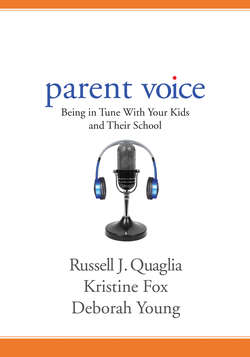Читать книгу Parent Voice - Russell J. Quaglia - Страница 12
На сайте Литреса книга снята с продажи.
Chapter 1 Noise or Voice?
ОглавлениеAt one time or another, all parents experience the feeling of being invisible to their children. There are occasions when it feels like our children can hear everyone and everything except us. They hear the ice cream truck jingle from miles away, respond to the ring of their cell phones no matter the surrounding noise level, and attentively listen to the latest Instagram or YouTube star. Yet, they are quite adept at tuning out parents’ voices. No matter how clearly we speak, our words are often background noise to our children. The question is, how can we help them tune in?
The concept of voice is not foreign to our children. Countless voices in different mediums compete for their “airtime,” and those voices are often at their fingertips. Today’s youth experience voice in ways unimaginable to earlier generations (particularly for those who believed children were better seen than heard!). Their voices can be expressed, discussed, and commented on at any time, all the time. They have 24/7 access to online forums, including blogs, videos, and petitions. Not only are children heard, but they are ready and willing to take action. Elementary students start GoFundMe or Kickstarter campaigns to raise money for important causes. Middle school students make a difference through online petitions at Change.org. High school students tweet their voices to share common concerns, stage protests, or share their peers’ admirable deeds and inspiring accomplishments.
Yet, even as our children’s voices are increasingly heard and honored, parent voice (perceived as noise to many children) often garners eye rolls and under-their-breath mutters, backed by the thought that parents just don’t get it! Children forget that their parents were children once, too. Parental noise can be in discord with the voices their children welcome. Parents’ “irritating” noises are often overshadowed by the “pleasant” sound of video games, Netflix, and tweets. Parent noise often drones on about daily directions, repeated reminders, simple suggestions, and continual do’s and don’ts. While some types of parent noise are unquestionably necessary, this must be distinguished from parent voice. In order for parents to gain meaningful airtime, parents must support their children’s voices and simultaneously serve as models for how to use voice effectively with others. Only then will our children tune out the noise and tune in to parent voice.
Parent voice and children’s voice are characterized as having the ability to speak openly and honestly in an environment that is driven by trust and responsibility. Parents with voice take the time to understand their child’s perspective, support their child, and advocate together for their child. When you value voice for yourself, you must support the voice of others in your life, and it is about much more than being vocal.
Parent voice is not about volume or control. It is not achieved by shouting or making decisions for children. Talking louder does not result in words having more meaning, influence, or value. Voice is a process that encourages parents to listen intently to their children, learn from them, and lead together to support their children’s aspirations.
Getting children to tune in to parent voice requires a conscious effort and practice by parents; it requires careful consideration about how and when you interact with your children on a daily basis. What opportunities are there to build the necessary trust and responsibility for voice to flourish for both parents and children? The opportunities do not need to be extravagant, just reliable—it is the everyday moments that matter: reading a bedtime story, having a snack together, acknowledging your child’s hard work at school, playing a game, walking to school, or appreciating your child’s assistance with younger siblings. Your children will know that this is a time when they have your attention. And you theirs. When life gets hectic, or school and work schedules conflict, even leaving notes for each other builds trust and a form of communication. When communication and time together are routine, raising any issue, large or small, is less daunting for children, and they can rely on these opportunities to discuss what is on their minds. Even when they choose not to share, relationships are fostered, as the shared experiences help everyone involved get to know each other a little better.
And for the times when in-person interactions are not an option, there is always. . . .
